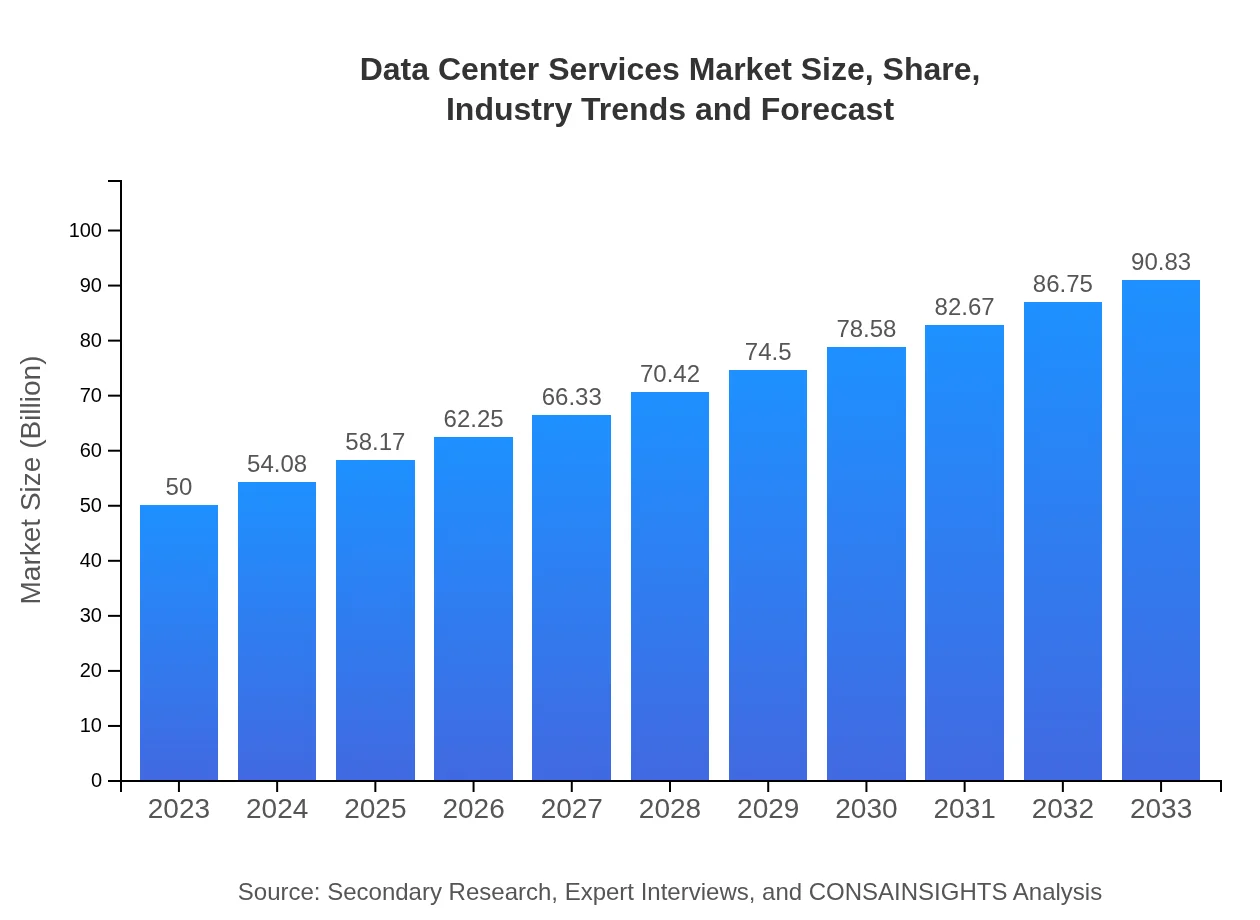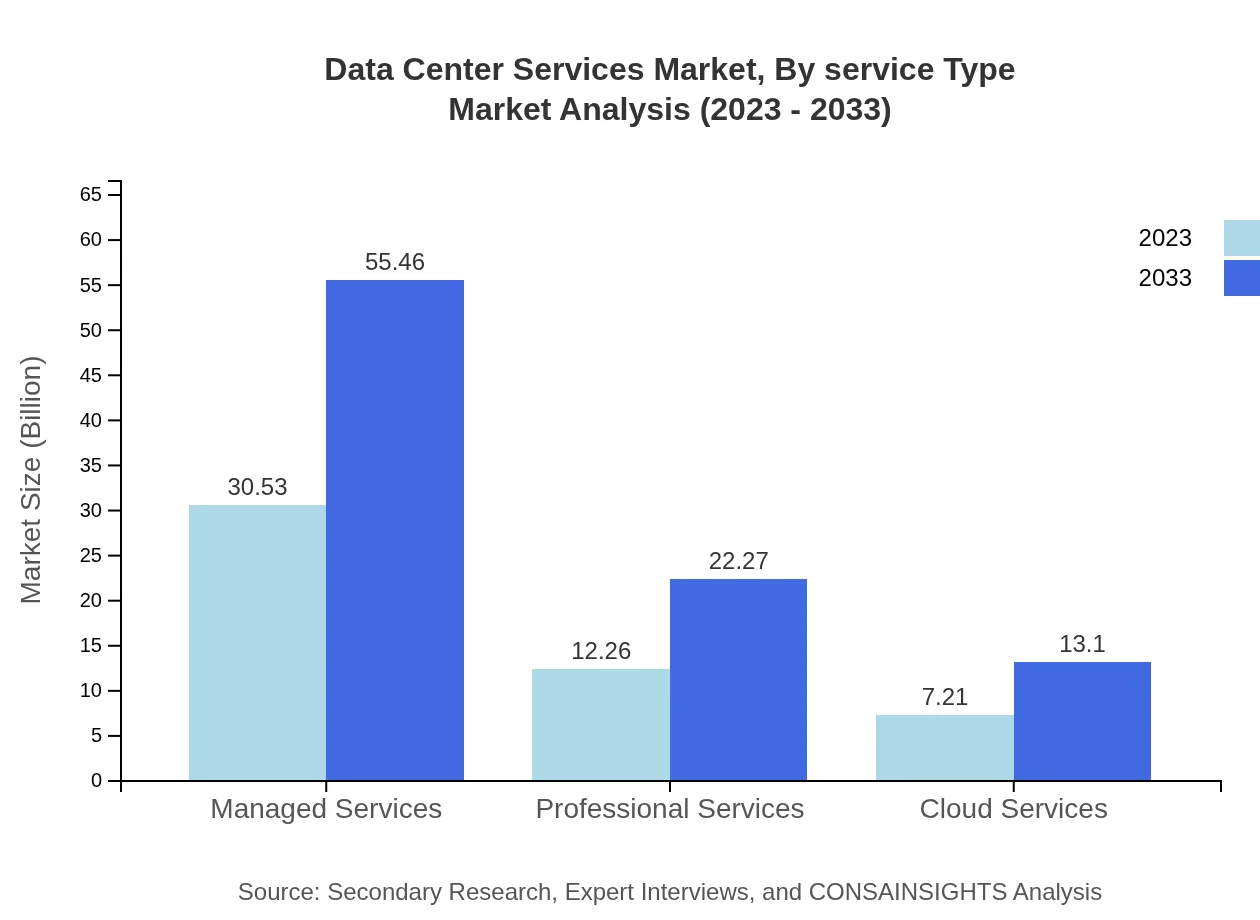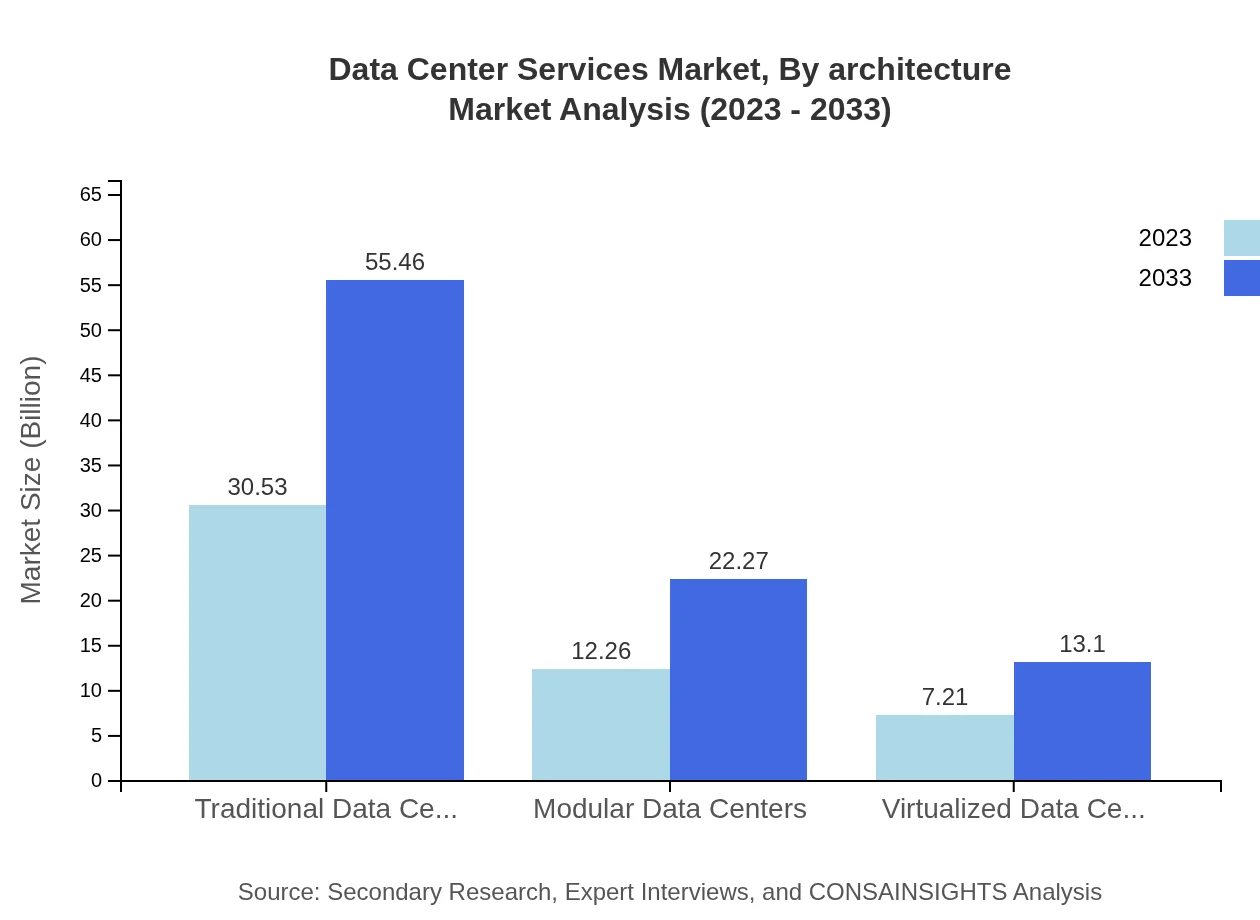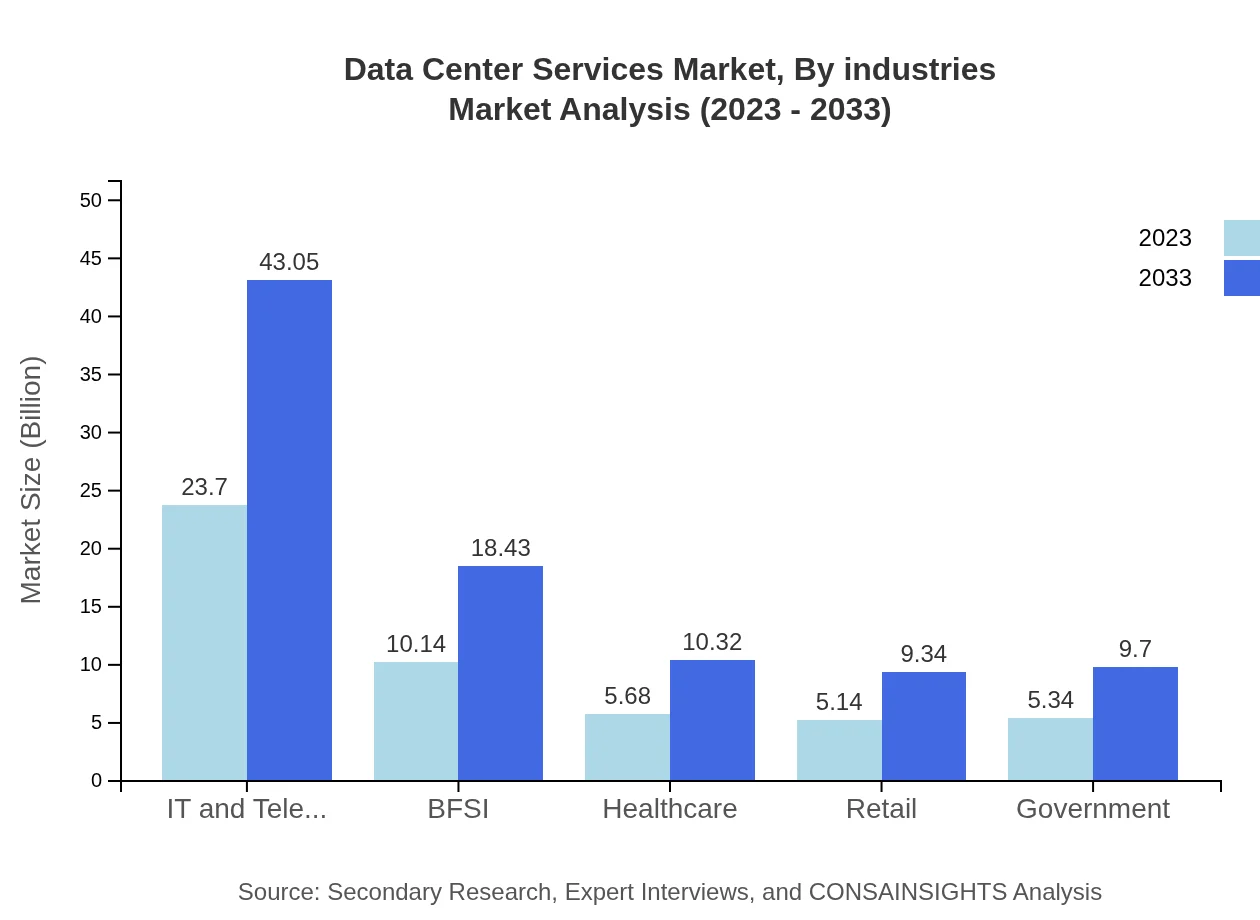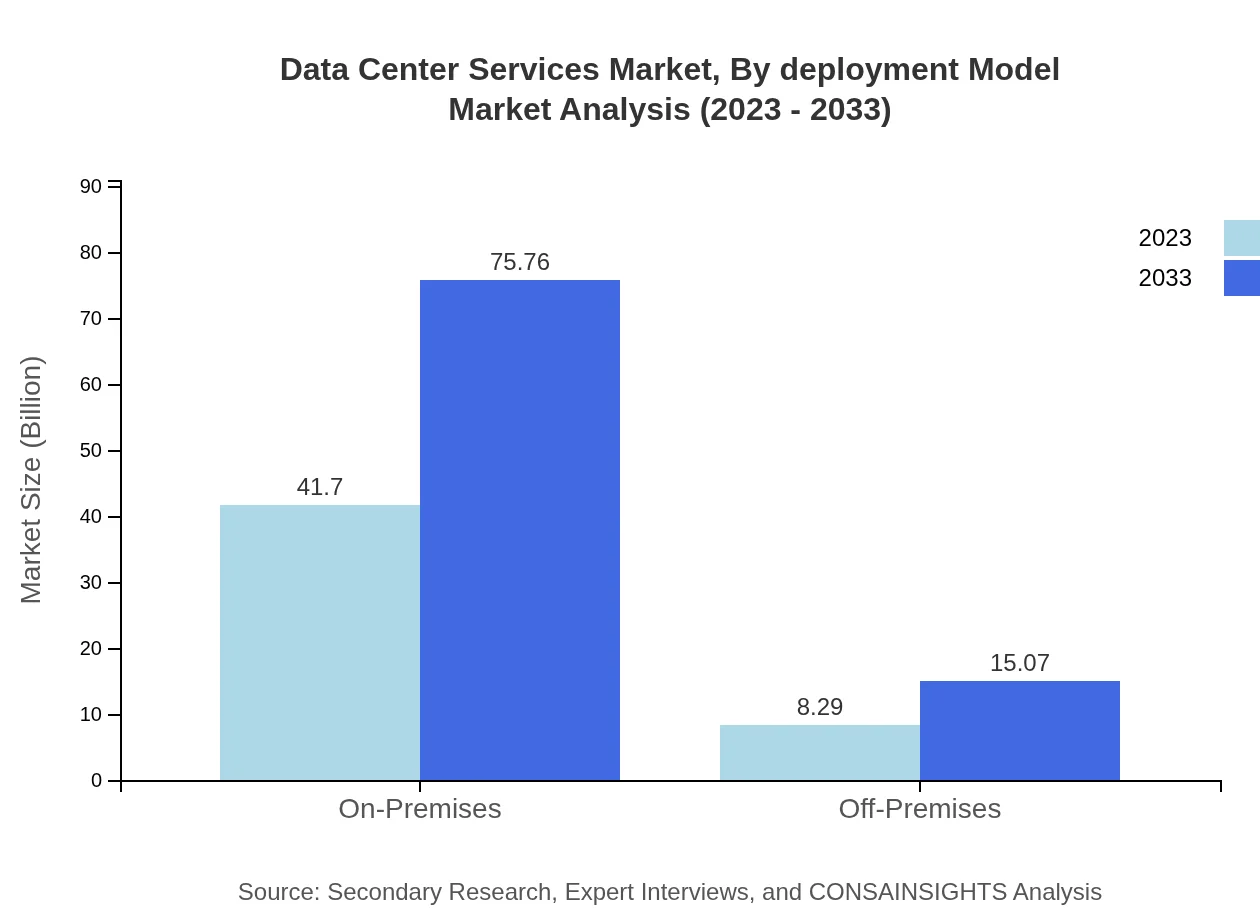Data Center Services Market Report
Published Date: 31 January 2026 | Report Code: data-center-services
Data Center Services Market Size, Share, Industry Trends and Forecast to 2033
This report provides an in-depth analysis of the Data Center Services market, covering key insights, current market conditions, and forecasts from 2023 to 2033, including market size, segmentation, regional analysis, and leading companies.
| Metric | Value |
|---|---|
| Study Period | 2023 - 2033 |
| 2023 Market Size | $50.00 Billion |
| CAGR (2023-2033) | 6% |
| 2033 Market Size | $90.83 Billion |
| Top Companies | IBM, Equinix , Amazon Web Services (AWS), Microsoft Azure |
| Last Modified Date | 31 January 2026 |
Data Center Services Market Overview
Customize Data Center Services Market Report market research report
- ✔ Get in-depth analysis of Data Center Services market size, growth, and forecasts.
- ✔ Understand Data Center Services's regional dynamics and industry-specific trends.
- ✔ Identify potential applications, end-user demand, and growth segments in Data Center Services
What is the Market Size & CAGR of Data Center Services market in 2023?
Data Center Services Industry Analysis
Data Center Services Market Segmentation and Scope
Tell us your focus area and get a customized research report.
Data Center Services Market Analysis Report by Region
Europe Data Center Services Market Report:
Europe's market is valued at $12.71 billion in 2023 and is expected to grow to $23.08 billion by 2033. The region's stringent data protection regulations and increasing cloud service adoption significantly contribute to growth, particularly in countries like Germany and the UK.Asia Pacific Data Center Services Market Report:
In 2023, the Asia Pacific region's Data Center Services market is valued at $10.36 billion and is forecasted to grow to $18.82 billion by 2033. Factors driving growth include rapid urbanization, increasing cloud adoption, and governmental initiatives promoting data localization. Countries like China and India are at the forefront due to their massive population and technology advancements.North America Data Center Services Market Report:
North America leads the Data Center Services market with a valuation of $17.05 billion in 2023, projected to reach $30.97 billion by 2033. This region benefits from a mature IT ecosystem and high demand for cloud services. The United States represents a significant portion of the market due to its technological innovations and investment in data security.South America Data Center Services Market Report:
The South American market stands at $4.39 billion in 2023, with an expected increase to $7.98 billion by 2033. Growth is driven by advancements in telecommunications and rising demand for data-driven decision-making among businesses. However, challenges remain in terms of infrastructure and connectivity.Middle East & Africa Data Center Services Market Report:
In the Middle East and Africa, the Data Center Services market stands at $5.49 billion in 2023 and is anticipated to grow to $9.97 billion by 2033. This market is driven by digital transformation initiatives, government investments in IT infrastructure, and a shift towards cloud services, although challenges related to economic stability persist.Tell us your focus area and get a customized research report.
Data Center Services Market Analysis By Service Type
The service type segment reveals a strong performance for Managed Services, currently amounting to $30.53 billion in 2023, projected to expand to $55.46 billion by 2033. IT and Telecom also showcase significant growth, contributing $23.70 billion in 2023 and expected to reach $43.05 billion by 2033.
Data Center Services Market Analysis By Architecture
In terms of architecture, traditional data centers dominate with a size of $30.53 billion in 2023 and expected to grow to $55.46 billion by 2033. However, Modular Data Centers are gaining traction, projected to increase from $12.26 billion to $22.27 billion within the same period.
Data Center Services Market Analysis By Industries
Market segmentation by industries highlights IT and Telecom leading with $23.70 billion in 2023, forecasted to reach $43.05 billion by 2033. The BFSI sector also showcases substantial growth, estimated at $10.14 billion in 2023 and anticipated to grow to $18.43 billion.
Data Center Services Market Analysis By Deployment Model
By deployment model, On-Premises solutions are significantly dominant with a market size of $41.70 billion and are expected to grow to $75.76 billion by 2033, while Off-Premises solutions are projected to increase from $8.29 billion to $15.07 billion.
Data Center Services Market Trends and Future Forecast
Tell us your focus area and get a customized research report.
Global Market Leaders and Top Companies in Data Center Services Industry
IBM:
IBM is a leading player in the Data Center Services market, offering a portfolio of services including cloud services, managed hosting, and infrastructure support.Equinix :
Equinix specializes in interconnection and data center services, operating a vast network of data centers globally with a focus on hybrid and multi-cloud strategies.Amazon Web Services (AWS):
AWS, a subsidiary of Amazon, is a major provider of cloud computing services, including data center services, enabling organizations worldwide to scale efficiently.Microsoft Azure:
Microsoft Azure provides a range of cloud services including those that underpin extensive data center operations, enhancing operational efficiency through advanced technologies.We're grateful to work with incredible clients.









FAQs
What is the market size of data Center Services?
The global data center services market is currently valued at approximately $50 billion and is projected to grow at a CAGR of 6% over the next decade. This growth reflects increasing demand for data storage and management solutions across industries.
What are the key market players or companies in this data Center Services industry?
Key players in the data center services market include IBM, Microsoft, Amazon Web Services, Google, and Digital Realty. These companies lead in innovation and infrastructure, providing reliable data solutions to businesses worldwide.
What are the primary factors driving the growth in the data Center Services industry?
Growth drivers include increased data generation, the rise of cloud computing, and the need for efficient data management solutions. Additionally, advancements in technology and a focus on digital transformation across sectors significantly fuel market expansion.
Which region is the fastest Growing in the data Center Services?
The fastest-growing region for data center services is North America, projected to grow from $17.05 billion in 2023 to $30.97 billion by 2033. Following this, Europe and Asia Pacific are also witnessing substantial growth.
Does ConsaInsights provide customized market report data for the data Center Services industry?
Yes, ConsaInsights offers customized market reports tailored to specific needs within the data-center-services industry. Clients can request bespoke reports focusing on niche markets, trends, or geographical regions.
What deliverables can I expect from this data Center Services market research project?
Deliverables typically include detailed reports containing market analysis, growth forecasts, competitive landscapes, and insights on regional and segment-specific trends within the data center services industry.
What are the market trends of data Center Services?
Current trends include the increasing shift towards hybrid IT models, enhanced focus on sustainable practices, and the adoption of AI and automation within data center operations, reflecting the evolving needs of businesses.

